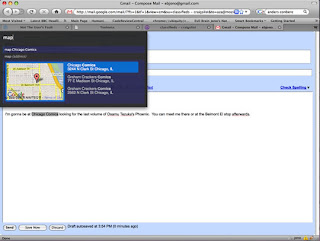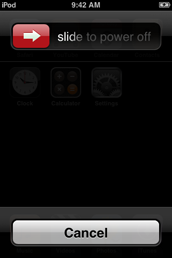I saw this blog post recently- Observation: Bookmarks Dead and it got me thinking about my own use of bookmarks. A quick background; I am a fairly heavy web user who does web research both professionally and just messing around. I swapped from various incomplete syncing solutions for my bookmarks to the social bookmarking service delicious about a year ago. What I noticed for the first time when I started thinking about this was that I actually almost never use bookmarks anymore! I have my bookmarks toolbar across the top of my browser (Firefox) with my most visited sites. Then I have a sidebar open of delicious bookmarks down the left hand side displaying sites chronologically as they were added, most recent at the top. I quite frequently click on the top 5 or 6 of these as I go back to topics I'm currently working with.
But really that's all I do. I can easily go a month between searches of this list to find a bookmark by its tag. Although delicious is fast and very well designed I usually just Google it again. As a bookmarks list, despite it being a good one, I never really use it. Maybe bookmarks are dead, at least for me.
When I find a useful piece of information I want to keep, I keep it, rather than just bookmarking the URL. I use Evernote or a WordPress javascript button to capture the page. I could use Zotero for this as well, but I want to keep my library organized for academic journal articles only, rather than misc web-stuff.
Sociality: Sure I might use delicious differently if I joined a social network of friends to share bookmarks. It would be great if there were recommendations, like from Amazon, of things someone with my profile might also like. At the moment I find most new links from blogs, FriendFeed and Google searches.
For me the URL-list is dead and the new social bookmarking only slightly better. I am living with a combination of (1) frequently visited sites (2) information storage (3) Googling everything else. Rather than Web_2.0 I feel like Web_0.5 is where I'm at!
Wednesday, 11 March 2009
Wednesday, 4 March 2009
Zotero to RSS
Although Zotero is not yet my primary reference manager it keeps getting better and better. I have been playing with the web interface, which is actually very good. I decided that I wanted to post new references to my FriendFeed account when I add them to Zotero, and some Google searching found a method. The Disruptive Library Technology Jester posts how to turn your Zotero library into an RSS feed which is then straightforward to add to FriendFeed. It worked for me after I made my Zotero library public and followed the instructions. Incidentally it doesn't have to be just your own Zotero library you subscribe to. If you find somebody interesting with a public library you can use this method to subscribe to their library too.
Saturday, 21 February 2009
Papers in your pocket
 Papers is a superb PDF management application for academics. It is very well designed, has great functionality and is beautiful. So I was very excited when Mekentosj the software developers announced that they were making a version for iPhones and iPod Touch.
Papers is a superb PDF management application for academics. It is very well designed, has great functionality and is beautiful. So I was very excited when Mekentosj the software developers announced that they were making a version for iPhones and iPod Touch.I signed up as a beta tester for the ipod touch app, so I've been playing with it for about 3 weeks off and on. It was released into the wild a few days ago so you can buy it now for £5.99 ($9.99) from the iTunes appstore. I really recommend this app, I deal with a lot of PDFs in my research and I wouldn't be without this. Definitely worth the money.
I guess you have to have a desktop version of Papers to get the most out of it, but I don't see why if you're not a user you can't just import a collection from the web to your device.
 I synchronized with my desktop collection of PDFs and transferred 1000 PDFs to my iTouch. It took a little while, as you would imagine, but was much faster than I thought (minutes not hours). Subsequent syncs are fast as only changes are being transferred.
I synchronized with my desktop collection of PDFs and transferred 1000 PDFs to my iTouch. It took a little while, as you would imagine, but was much faster than I thought (minutes not hours). Subsequent syncs are fast as only changes are being transferred.The PDFs are available by browsing the entire library or in a series of subject folders that I had previously set up. There are listings by author and journal too.
There is an interface to search the web for new articles too. The search options are for the major science journal repositories like JSTOR, Web of Science, Google Scholar and PubMed. It seems to work well, and allows you to import either the reference or the PDF. It displays the journal web page where appropriate, BMC Evolutionary Biology in the screenshot below, and PDF import is straightforward.


 PDFs can of course be viewed and browsed in both portrait and landscape orientations. References can be emailed, flagged and notes attached.
PDFs can of course be viewed and browsed in both portrait and landscape orientations. References can be emailed, flagged and notes attached.This is an amazing productivity tool in a well thought out and well designed interface. I carry all my PDFs with me, and can catch up on reading on the train or wherever. Its also useful in many other situations to be able to instantly check something in a paper (Journal club? Seminar? Coffee room discussion?).
Labels:
bibliography software,
iPod touch,
Papers,
PDF
Wednesday, 11 February 2009
Ubiquity
 I've just watched a video on Ubiquity from Mozilla labs. Wow, looks great. Must try it out. You need to see the video to really get an idea of what it is all about, but it bring shortcuts into your browser to connect together different parts of the web to make life easier.
I've just watched a video on Ubiquity from Mozilla labs. Wow, looks great. Must try it out. You need to see the video to really get an idea of what it is all about, but it bring shortcuts into your browser to connect together different parts of the web to make life easier.Select a name or address and type "map" within the browser, it places the location on a map! It also interacts with other services such as mail and calendar applications.

Sunday, 25 January 2009
Friday, 23 January 2009
Google Notebook to Evernote
I'm sad that Google has discontinued its Notebook application, I was a fan. Evernote announced an import path to get Google notebooks into Evernote today. It works really well. Although they say "We even maintain the creation date", but that didn't work at all, the imported notes had today's date on them, but otherwise it was fine.
I really like Evernote, it is powerful and very well-designed. But it makes me nervous. There is still no decent export. If Evernote goes extinct would I be able to recover the information? Probably not. Yes I can export in Evernote's weirdo xml format but then what? The GNotebooks are exported as atom xml from Google then imported into Evernote. I only hope that this means that Evernote have solved their note to xml translation problems and a sensible export will appear very soon.
I really like Evernote, it is powerful and very well-designed. But it makes me nervous. There is still no decent export. If Evernote goes extinct would I be able to recover the information? Probably not. Yes I can export in Evernote's weirdo xml format but then what? The GNotebooks are exported as atom xml from Google then imported into Evernote. I only hope that this means that Evernote have solved their note to xml translation problems and a sensible export will appear very soon.
Sunday, 7 December 2008
iPod won't sync photos
 I've just had a problem syncing my iPod Touch. I would get an error mid sync "The iPod "iPod Name" cannot be synced. An unknown error occurred (-50)."
I've just had a problem syncing my iPod Touch. I would get an error mid sync "The iPod "iPod Name" cannot be synced. An unknown error occurred (-50)."I've done a lot of Googling for explanation and a fix, it took quite a while, so I thought I'd share.
The crash always happened when syncing photos. So after not getting very far with the usual suggestions I ignored all causes and fixes not relating to photos. The problem seems to have come from me replacing my iPhoto library with a different one since my last iPod sync. The solution (for me) was to delete the iPod photo cache folder.
- Find your current iPhoto library in the Photos folder
- Right (ctrl) click and select 'show package contents'
- In the new window delete the folder iPod Photo Cache
This link helped more than any other.
Wednesday, 15 October 2008
G(oogle)Mail
I was investigating using GMail as online storage space today. It gives 7.2 Gigs of space now! I haven't decided on this or tested anything, but I came across a curious warning on the Gspace FAQ site. It said to be very careful that you put name@googlemail.com not name@gmail.com if that was your address otherwise your files could potentially be sent to someone else's account!
I was momentarily panicked, thinking about all the mails I had been missing- I use both interchangeably when giving my email address. After a bit of testing (sending emails to both addresses from a different account) it turns out this is absolutely false. Both just work. I remember when I signed up it gave me the @googlemail.com address but @gmail.com does exactly the same in all emailing and logging on options I have found.
Maybe there is some complex situation regarding the specifics of Gspace that I haven't appreciated but in terms of direct access to my mail account the two addresses seem identical. I'm considerably more relaxed now, but I still think I will set up a second account if I do decide to use it as a file server mostly in case uploading activity causes the account to be temporarily blocked.
I was momentarily panicked, thinking about all the mails I had been missing- I use both interchangeably when giving my email address. After a bit of testing (sending emails to both addresses from a different account) it turns out this is absolutely false. Both just work. I remember when I signed up it gave me the @googlemail.com address but @gmail.com does exactly the same in all emailing and logging on options I have found.
Maybe there is some complex situation regarding the specifics of Gspace that I haven't appreciated but in terms of direct access to my mail account the two addresses seem identical. I'm considerably more relaxed now, but I still think I will set up a second account if I do decide to use it as a file server mostly in case uploading activity causes the account to be temporarily blocked.
Sunday, 28 September 2008
Zotero under fire
Zotero the excellent, free, open-source reference manager is under fire from its closed source competition via a law suit. Thomson Reuters the makers of the unstable and expensive market-leading Endnote software have sued George Mason University, the developers of Zotero, for "violating its license agreement and destroying the EndNote customer base" (Courthouse News Service). The complaint comes primarily from the fact that the latest version can import Endnote styles. I picked up on this from Neil Saunders' blog post who puts it really well
Zotero is not alone however. There are a growing number of free (though often not open source) web based reference management systems. Maybe Thomson Reuters are just trying to mark out some territory and delay the inevitable a bit longer. Ultimately they are going to fail, I just hope their lawyers don't hurt Zotero too much on their way down.
"Here’s my simple, black-and-white view of the world. The greatest achievement of the internet is the potential to set information free. There are free-thinking, forward-looking organisations like GMU who see this potential and act upon it. There are also organisations who see only threats to their corporate interests. Publishing corporations no longer control the flow of information to consumers and some of them seem to be struggling to accept this, adapt and move on."Our support should definitely go to George Mason University who have moved the world forward and improved it with not just a piece of software but a great implementation of the open-source idea. This is software driven forward by users, in this case initially at the GMU's Center for History and New media. Comically there is also a claim that "GMU reverse engineered Reuters' EndNote software to create Zotero". I don't see any signs of that, thankfully they are not very similar in any meaningful respect, Zotero is generally much better. Zotero works nicely from within a web browser, Endnote works when it feels like it.
Zotero is not alone however. There are a growing number of free (though often not open source) web based reference management systems. Maybe Thomson Reuters are just trying to mark out some territory and delay the inevitable a bit longer. Ultimately they are going to fail, I just hope their lawyers don't hurt Zotero too much on their way down.
Labels:
bibliography software,
Endnote,
Open-Source,
Zotero
Saturday, 20 September 2008
Mobile Blogging
I'm trying out blogging from my iPod touch. I just downloaded the free app life something. Quite straightforward to set up.
Don't yet know the important details like if I can save drafts or edit posts or what the app is really called (it doesn't say on this page and i've forgotten). Will press "Done" and see what happens! LifeCast, that's it.
Posted with LifeCast
Don't yet know the important details like if I can save drafts or edit posts or what the app is really called (it doesn't say on this page and i've forgotten). Will press "Done" and see what happens! LifeCast, that's it.
Posted with LifeCast
Subscribe to:
Posts (Atom)



